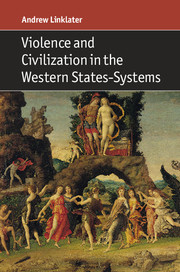Book contents
- Frontmatter
- Epigraph
- Contents
- Preface and Acknowledgements
- Introduction
- 1 The Hellenic City-States System
- 2 New Territorial Concentrations of Power in Antiquity
- 3 The International Relations of Latin Christendom
- 4 The Renaissance City-State System
- 5 The European States-System and the Idea of Civilization
- 6 Cruelty and Compassion in the Age of Empire
- 7 Enlightenment Thought and Global Civilization
- 8 Total Warfare and Decivilizing Processes
- 9 Modernity, Civilization and the Holocaust
- 10 Sovereignty, Citizenship and Humanity in the Global Civilizing Process
- 11 Process Sociology, Civilization and International Society
- Conclusion
- Bibliography
- Index
5 - The European States-System and the Idea of Civilization
Published online by Cambridge University Press: 28 March 2017
- Frontmatter
- Epigraph
- Contents
- Preface and Acknowledgements
- Introduction
- 1 The Hellenic City-States System
- 2 New Territorial Concentrations of Power in Antiquity
- 3 The International Relations of Latin Christendom
- 4 The Renaissance City-State System
- 5 The European States-System and the Idea of Civilization
- 6 Cruelty and Compassion in the Age of Empire
- 7 Enlightenment Thought and Global Civilization
- 8 Total Warfare and Decivilizing Processes
- 9 Modernity, Civilization and the Holocaust
- 10 Sovereignty, Citizenship and Humanity in the Global Civilizing Process
- 11 Process Sociology, Civilization and International Society
- Conclusion
- Bibliography
- Index
Summary
The wars of the seventeenth century were cruel in a somewhat different sense from those of today. The army had, as far as possible, to feed itself when on foreign soil. Plunder and rapine were not merely permitted, but were demanded by military technique. To torment the subjugated inhabitants of occupied territories and to set fire to their houses – all this was, as well as a means of satisfying lust, a deliberate means of collecting war contributions and bringing to light concealed treasure. Soldiers were expected to behave like robbers. It was banditry exacted and organised by the army commanders
(Elias 2006: 101–2)Elias's comments about seventeenth-century warfare have to be considered in conjunction with his reflections on the longer-term process of state formation that was centred on the dual monopolization of the instruments of violence and taxation. Territorial concentrations of power led to advances in domestic pacification. But the citation at the beginning of this chapter drew attention to the violent character of state formation. The passage was part of a larger discussion about the expulsion of the Huguenots from France that highlighted the use of pliable returning troops to achieve a royal political objective with parallels in many other parts of Europe where emergent states were similarly engaged in rounding out territory, consolidating centralized powers, and subduing recalcitrant subjects (Rae 2002). The wars of that period, Elias argued, were not less cruel than the struggles of the present era; they were cruel in different ways. But what form did cruelty take, and how should later changes be explained? The questions are fundamental to reflections on the distinguishing features of the modern states-system in the following five chapters and to the concluding observations about how key differences are best explained. Those considerations require some observations later in this introduction about the distinctive features of a process-sociological approach to analysing the relationship between violence and civilization in the modern system of states.
Returning to the questions above, part of the reason for the cruelty of seventeenth-century armies is that they had to live off the land; plunder was an essential means of survival. The citation stresses that there was more to their behaviour than violent self-reliance.
- Type
- Chapter
- Information
- Violence and Civilization in the Western States-Systems , pp. 186 - 225Publisher: Cambridge University PressPrint publication year: 2017

